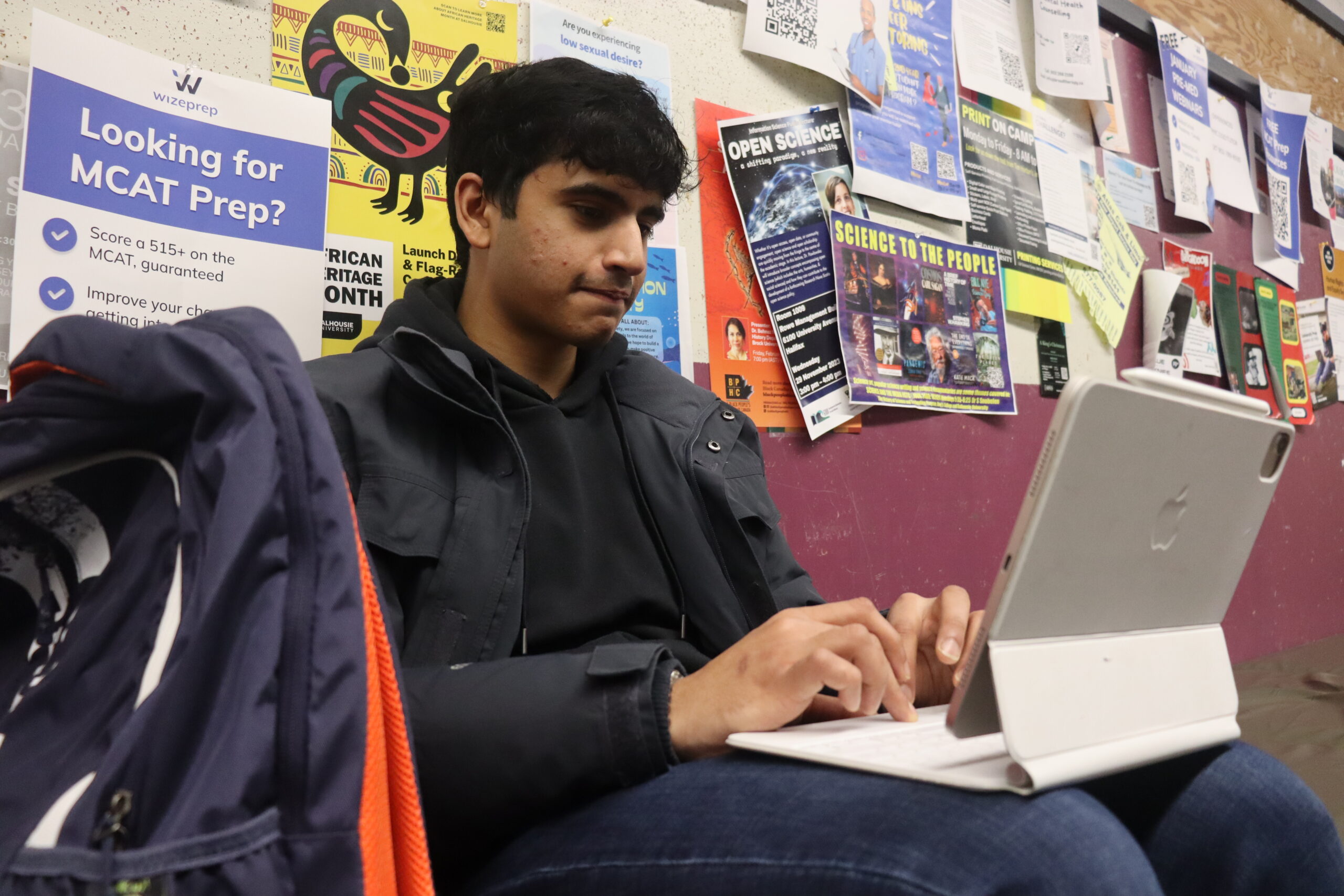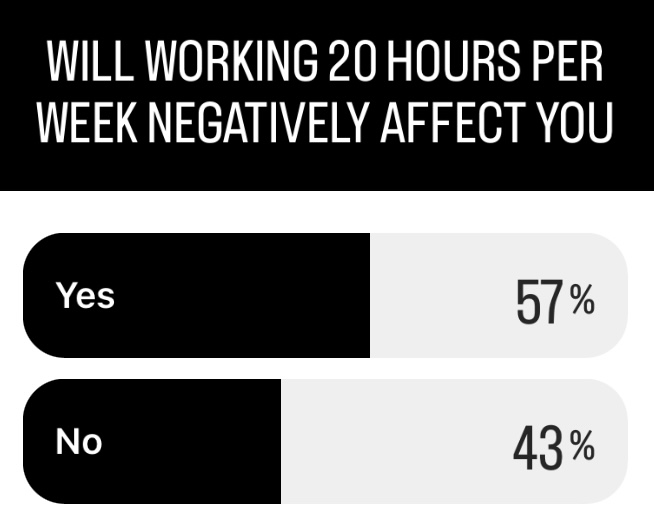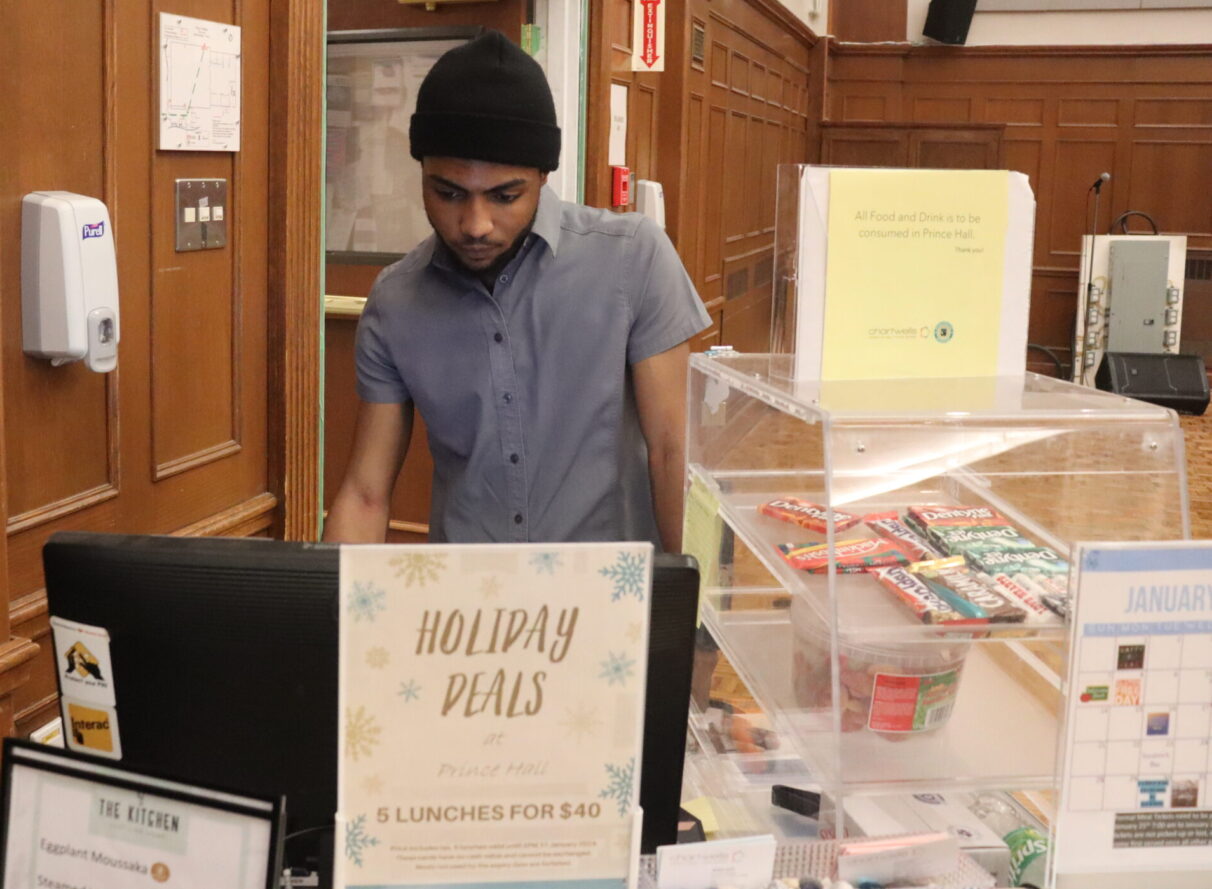Federal change to work hours is in international students’ interest, says influencer
Foreign students will be limited to no more than 20 hours of work per week after April

caption
First-year international student Aryan Vesuna does an assignment while waiting for his instructor outside a classroom at Dalhousie University.The federal government’s move to restrict the number of hours international students can work is tolerable — and even may be beneficial — says one student and a social media influencer.
International students, whose work-hour restrictions were lifted in the past year, might have worked too much to study properly, said Max Medyk, an immigration influencer.
“We should follow the current policy and limit the working hours, even though it’s probably unpopular among the (majority) of people,” Medyk, who is based in Halifax, said.
“Maybe they haven’t realized it, but it will benefit their long-term career.”

caption
Max Medyk helps a volunteer search for a job on LinkedIn during an AI workshop in Halifax.The Department of Immigration, Refugees and Citizenship (IRCC) waived a restriction on the number of hours per week international students could work for one year, beginning in December 2022. In December 2023, IRCC extended the waiver to the end of April, but after April 30 of this year, IRCC will re-introduce a limit of 20 hours a week.
Medyk has more than 250,000 total followers on YouTube, TikTok, Instagram, and Bilibili. The content Medyk posts on social media is about international students and immigrants. He did a poll on Instagram to ask if students would be affected by a cap on work hours. Two thousand people participated in this poll and 57 per cent said “yes.”

caption
The poll Max Medyk did on Instagram.“Allowing international students to work full-time, we risk losing Canada’s brand as a reputable destination for studies,” Medyk said. “They might stay working in minimum wage jobs forever and not contribute on a greater level as a working professional.”
Medyk said many international students are distracted by their work, focusing on making money rather than their education. Working full-time makes it hard for students to succeed in school, he said.
Qin Zhen is a Chinese student who studies mathematics at Mount Saint Vincent University who currently works around 17 hours per week. Last semester, he took five courses in school. When he worked for 17 hours per week, he found it difficult to find enough time to rest between studying and sleeping. He usually works 35 hours during summer break when the IRCC doesn’t impose limitations on the number of hours international students can work.
“The money I earn during the summer break is usually enough for me to spend for one or one and a half semesters,” Zhen said. “If I don’t work that much, I still could be alive. It is just for me to live more comfortably.”
Phung Anh Dinh has a different experience. She is from Vietnam and she also studies at Mount Saint Vincent University. She occasionally works more than 20 hours during the school year, but she works about 40 hours during summer break.
She said the change will disrupt her financial plans and those of her friends. When they can no longer choose how many hours to work as they do now, they may have to find another job with a higher hourly wage to make up for the gap in income and expenses, increasing their uncertainty in the coming months.
“The money that you earn here is a huge support in your life,” Dinh said. “Immigration has been pretty strict on international students lately.”
On Monday, Ottawa announced a two-year cap on international student visas. IRCC will only issue 360,000 study permits, a 35 per cent reduction. In some provinces, such as Ontario, the reduction will be 50 per cent or more.
Dinh said IRCC should have solutions for making up students’ losses.
“Since they don’t allow us to work more than 20 hours anymore, maybe they should have some kind of financial support for us, like maybe decreasing the tuition fee,” she said.
Emmanuel Oloyede, an international student at Nova Scotia Community College, said inflation and high tuition fees make living in Canada unaffordable. He usually works around 25 hours a week and worries about only being able to work 20 hours every week when the regulations change in April.
“It definitely would make a difference in my budget,” he said.

caption
Emmanuel Oloyede works at Prince Hall at the University of King’s College.Medyk, the immigration influencer, encourages international students to find higher paying jobs where they can apply the skills they learned in school and not have to work so many hours and put their studies in jeopardy.
“Some of those people tell me that they pay tutors to do their assignments. They neglect homework basically by outsourcing homework … They skip classes and so on,” Medyk said.
“My only concern is that they might be sacrificing their long-term success for today’s earnings.”
About the author
Xixi Jiang
Xixi Jiang, who often goes by Jacky, is from China. She’s a fourth-year student in BJH program at the University of King’s College.
